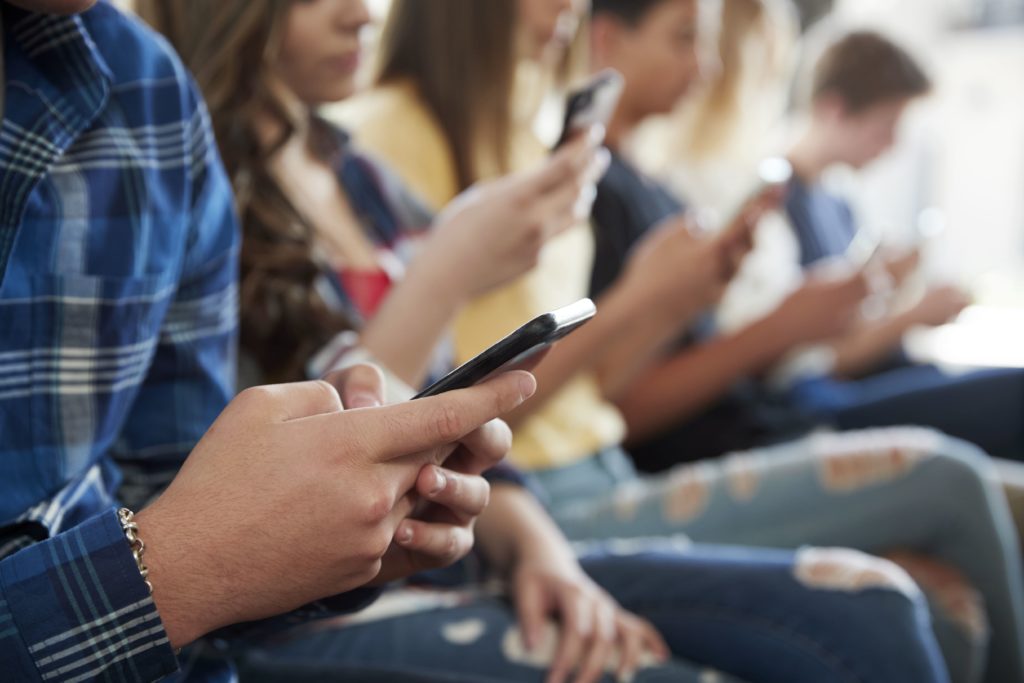
It’s late in the afternoon when I tell my daughter, “Mariana! It’s dinnertime!” I typically get no response. I ask her again, “Mariana? Hello?!” As I walk into her bedroom, I watch my daughter on her bed, looking at her phone and scrolling away.
I ask her, “Mariana, did you hear me calling you?”, but she continues to scroll on her phone and simply replies, “Yes, mom?”. I ask her to please put her phone away because it’s time for dinner. She continues to scroll, scroll, scroll until she finally puts her phone down and rolls her eyes as she joins the rest of our family for dinner.
As a parent, does this situation sound familiar?
The Rise of Social Media Usage
Nowadays, children and teenagers use their phones quite a bit. In the United States, the proportion of young children, between the ages of 13 and 17 years old, who have a smartphone has reached 89% – more than double what it was six years ago. Moreover, 70% of teenagers visit some type of social media platform multiple times per day, which is significantly up from what it was in 2012 – which was only a third of teens.
To compare, when the Pew Research Center started tracking social media adoption in 2005, just 5% of Americans said they used social media platforms. Today, 69% of Americans are social media users. Quite the increase, huh?
Recently published news articles suggest that many social platforms are designed to encourage engagement among users and can affect or be harmful to a large percentage of young people, especially teenage girls. Recent documentaries have also examined the various ways social media and social networking companies can manipulate human psychology to rewire the human brain and are considering what this means for society moving forward.
How Social Media Can Influence Younger Generations
You may now be asking yourself: How exactly can social media be harmful?
Social media has a reinforcing nature (remember the incessant scrolling at the beginning of this article?). Constantly using social media activates the brain’s reward center by releasing dopamine, a “feel-good chemical” linked to pleasurable activities such as sex, food, and social interaction. This also means that the more “likes” you receive on a post, the better you feel, or the more comments or emojis you receive on a post, the more popular you may feel.
On the opposite spectrum, if your post is ignored or if certain people don’t like or comment on your post, the devastation you may feel is very real. Parents and many of my professional colleagues may consider this addictive and contributory to anxiety, depression, or other mental health ailments. Long ago, if you were not invited to a party or event, you may never have found out (and if you did, it was much later). Now, kids immediately find out if they were not invited to said party or event. Another study found that students who spent more time on social media were more likely to feel FOMO or “fear of missing out”, which is feeling envious or sensing that others within their social network are better off than they are.
Unfortunately, children are also exposed to unhealthy habits through social media like self-harm or eating disorders. At times, abnormal or altered images of models, or even regular people who use photo filters to make it seem like they don’t have one blemish, appear online. Seeing this, the teenager may want to strive to appear that way by overexercising or over dieting – all to look like that person that doesn’t really exist.
The Digital Age is Here to Stay, so What Can Parents Do?
This information may seem scary, so now the important question is: What can a parent do to protect their children from the harmful effects of social media?
First of all, studies demonstrate that parent modeling is one of the top predictors of phone use. If you put your phone down, your child will too. You can also try to have an honest and open conversation with your child about your concerns.
Secondly, educate yourself on social media platforms. It’s important to understand the applications and how their privacy tools work, and ensure that the proper settings are implemented. Additionally, know that children and teenagers can scroll on “Explore Pages” and follow hashtags, which can lead to finding inappropriate content as a result. However, taking precautions can limit inappropriate content.
Some other tips to teach kids how to be smart about social media include:
- Stressing the importance of developing healthy social media habits by limiting screen time to no more than 1-2 hours a day.
- Supervise what your child is viewing on social media, especially when you are gathered in a common living area.
- Finding and managing your child’s location.
- Ask your child to put away their phone while studying or while at a family event, preferably keeping the phone in another room.
- Turning off or muting notifications and blocking unwanted accounts.
A Solution for Both Parents and Kids
In order to be a better model for your child, when you’re scrolling through your own social media channels, know what you want to get out of it and do it in a timely manner. Then, immediately get off to avoid getting stuck on the never-ending scrolling loop and setting a negative example for your children. If you are feeling anxious or depressed, it may be beneficial to take a break from social media. Teach your child the same concept.
Many parents and patients may think a routine checkup means only assessing your child’s physical health, but today, pediatricians are trained to help assess a child’s comprehensive health. Maintaining a routine schedule with a pediatrician can help your child’s mental and emotional well-being.
Lastly, for further resources and useful health and safety tips to support youth regarding the use of social media, visit the American Academy of Pediatrics Healthy Children website.
References
- Smith, A. (2017, January 12). Record shares of Americans have smartphones, home broadband. Pew Research Center. https://www.pewresearch.org/fact-tank/2017/01/12/evolution-of-technology/
- Sperling, J. (2021, February 9). How does social media affect your mental health | McLean hospital. Www.mcleanhospital.org; McLean Hospital. https://www.mcleanhospital.org/essential/it-or-not-social-medias-affecting-your-mental-health
- Rideout V, Robb MB. Social media, social life: teens reveal their experiences. San Francisco: Common Sense Media; 2018.
- Abi-Jaoude, E., Naylor, K. T., & Pignatiello, A. (2020). Smartphones, social media use and youth mental health. CMAJ, 192(6), E136–E141. https://doi.org/10.1503/cmaj.190434
- Wells, G., Horwitz, J., & Seetharaman, D. (2021, September 14). Facebook Knows Instagram Is Toxic for Teen Girls, Company Documents Show. Wall Street Journal. https://www.wsj.com/articles/facebook-knows-instagram-is-toxic-for-teen-girls-company-documents-show-11631620739
 Dr. Ana Hernandez-Puga is a proud member of the TopLine MD Alliance practicing Pediatrics in Miami-Dade County.
Dr. Ana Hernandez-Puga is a proud member of the TopLine MD Alliance practicing Pediatrics in Miami-Dade County.
The TopLine MD Alliance is an association of independent physicians and medical practice groups who are committed to providing a higher standard of healthcare services. The members of the TopLine MD Alliance have no legal or financial relationship with one another. The TopLine MD Alliance brand has no formal corporate, financial or legal ties to any of the affiliated physicians or practice groups.



